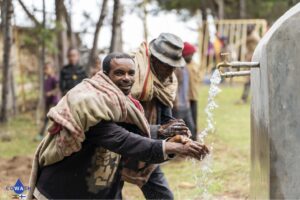Simple Handwashing Saves Lives: Promoting Handwashing Practice in Rural Ethiopia
Every year, the world celebrates Global Handwashing Day to highlight the importance of this simple yet effective practice in preventing the spread of diseases. In rural Ethiopia, where access to basic hygiene services is limited, inadequate handwashing poses significant health risks, particularly among children. On this year’s Global Handwashing Day, we explore the importance of handwashing and how COWASH IV is contributing to improved handwashing practices in these communities.
Why are clean hands important?
Handwashing with soap is a simple yet effective way to prevent a range of diseases and the spread of infections. As Amarech Zemede, a health extension worker at Untelo Health Post in Gacho Baba Woreda, one of COWASH IV’s project areas in South Ethiopia, emphasizes, handwashing is a cost-effective and essential practice for protecting ourselves from diseases caused by poor hygiene. Studies also show that handwashing with soap can reduce diarrheal diseases by 30% and acute respiratory infections by up to 20%.
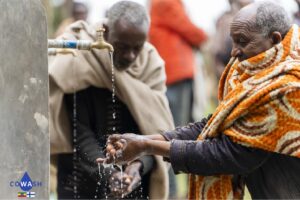 Moreover, proper hand hygiene is linked to various benefits including reduced school absenteeism, improved wellbeing, dignity and productivity. Yerom Demisse, a health extension worker at Zemeten Health Post in Dejen, another project woreda of COWASH IV in Amhara Region, shares that handwashing has contributed to improved school attendance in her community. She says “children were previously absent due to poor hygiene and frequent visits to the health post.”
Moreover, proper hand hygiene is linked to various benefits including reduced school absenteeism, improved wellbeing, dignity and productivity. Yerom Demisse, a health extension worker at Zemeten Health Post in Dejen, another project woreda of COWASH IV in Amhara Region, shares that handwashing has contributed to improved school attendance in her community. She says “children were previously absent due to poor hygiene and frequent visits to the health post.”
Handwashing is also part of the Sustainable Development Goals where promoting high levels of hand hygiene practices can contribute to their achievement.
Despite its importance, handwashing practices in rural communities remain at an early stage and require further attention. Ebsa Feyisa, COWASH IV’s social and behavioral change specialist, notes that even with those communities who have handwashing facilities, the availability of soap is a significant challenge.
COWASH IV: Promoting handwashing in rural Ethiopia
One of the focus areas of COWASH IV, a bilateral project between Ethiopia and Finland, is to improve handwashing practices in rural communities. The project promotes handwashing through three key initiatives: demand creation, developing and an enabling environment and financial and supply access.
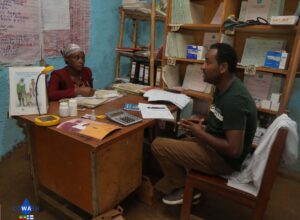 According to Ebsa, while awareness of handwashing has increased, there is still a gap in applying this knowledge due to negligence and beliefs that discredit its importance. COWASH IV is implementing different social and behavioral change programs to address these challenges and promote handwashing. Among others, the project provides training programs and supervision support to health extension workers to influence communities and reinforce positive behavior. Particularly the on-the-job training program for health extension workers and other stakeholders makes COWASH IV’s intervention unique.
According to Ebsa, while awareness of handwashing has increased, there is still a gap in applying this knowledge due to negligence and beliefs that discredit its importance. COWASH IV is implementing different social and behavioral change programs to address these challenges and promote handwashing. Among others, the project provides training programs and supervision support to health extension workers to influence communities and reinforce positive behavior. Particularly the on-the-job training program for health extension workers and other stakeholders makes COWASH IV’s intervention unique.
Amarech highlights this instrumental role of the project in supporting her team’s effort to raise awareness and promoting handwashing in her community. Her team implement various activities to encourage handwashing, including house-to-house visits, school-based interventions and teaching at various community events. She says the project’s training programs and supervision support for health extension workers have been crucial in enabling them to effectively deliver these works. These combined efforts have led to a noticeable improvement in the community’s hygiene practices, particularly among children, says Amarech.
Yerom agrees with Amarech expressing her joy to observe a positive change in her community. “Many children used to visit our health post due to illnesses related to poor hygiene and we would often carry oral rehydration therapy and zinc during our house-to-house visits” shares Yerom. However, the situation has improved, with fewer people reporting similar problems to her health post following the interventions. For Yerom, the project’s work in providing communities with safe water supply along the training programs has played a crucial role in promoting handwashing.
COWASH IV is also promoting handwashing through communication interventions that aimed at ensuring practical implementation. The project has developed and disseminated posters that raise awareness and promote handwashing in public service areas such as health posts, schools and Kebele administrations. Additionally, the project has produced and distributed audio and video messages through social media, available websites, local TV stations and radio channels. These educational materials are available in three local languages: Amharic, Afan Oromo and Sidaamu Afoo.
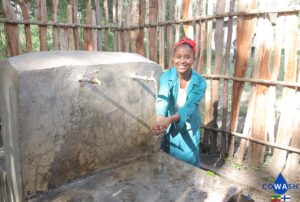 COWASH IV’s second intervention area aims to create an enabling environment. The project collaborates with partners at various levels, from national to kebele, to establish an enabling environment for handwashing promotion. This involves participating in developing roadmaps and guidelines at the national level and providing support to government systems, including the health extension program.
COWASH IV’s second intervention area aims to create an enabling environment. The project collaborates with partners at various levels, from national to kebele, to establish an enabling environment for handwashing promotion. This involves participating in developing roadmaps and guidelines at the national level and providing support to government systems, including the health extension program.
COWASH IV also provides comprehensive WASH interventions in schools and health posts. In addition to constructing water schemes and improved latrines, the project has built dedicated handwashing facilities in schools and health posts. These efforts, combined with awareness-raising activities, encourage students to wash their hands and influence their families.
Million Wolde Giyorgis, a health extension worker at Wegencho Kebele Health Post in Yezm Zone, Central Ethiopia, highlights the positive impact of a water point constructed by COWASH IV in 2015. Prior to the water point, the lack of clean water made daily tasks, such as handwashing for procedures like inserting birth control implants, significantly more challenging.
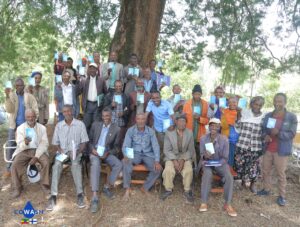 The third focus area of COWASH IV’s handwashing intervention is creating financial and supply access for rural communities. To achieve this, the project is establishing market-based sanitation centers and facilitating the establishment of WASH savings and loan associations (SLAs). The sanitation centers offer affordable sanitation supplies, including liquid soap. WASH SLAs, on the other hand, provide communities with financial access to purchase and install handwashing facilities along with improve household latrines.
The third focus area of COWASH IV’s handwashing intervention is creating financial and supply access for rural communities. To achieve this, the project is establishing market-based sanitation centers and facilitating the establishment of WASH savings and loan associations (SLAs). The sanitation centers offer affordable sanitation supplies, including liquid soap. WASH SLAs, on the other hand, provide communities with financial access to purchase and install handwashing facilities along with improve household latrines.
Demissie Menegesha, a resident of Chirone Woreda, where COWASH IV established a market-based sanitation center, highlights the positive impact of the centers in providing high-quality soap at an affordable price which in turn is improving handwashing practice.
Handwashing is a simple yet powerful tool in preventing diseases and improving health outcomes in rural Ethiopia. COWASH IV’s comprehensive approach, which includes demand creation, financial and supply access, and an enabling environment, is making a significant impact. By addressing challenges and promoting behavior change, COWASH IV is helping to ensure that clean hands save lives in rural communities.
